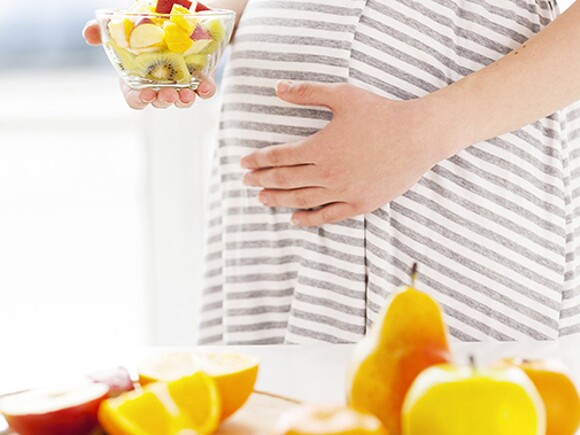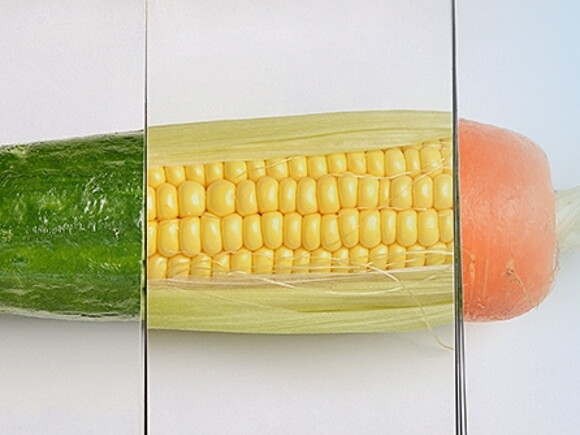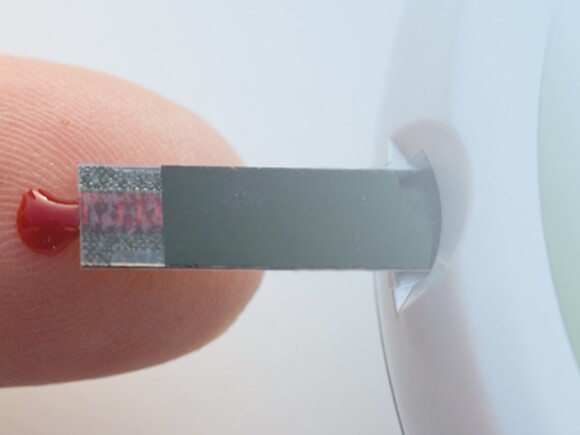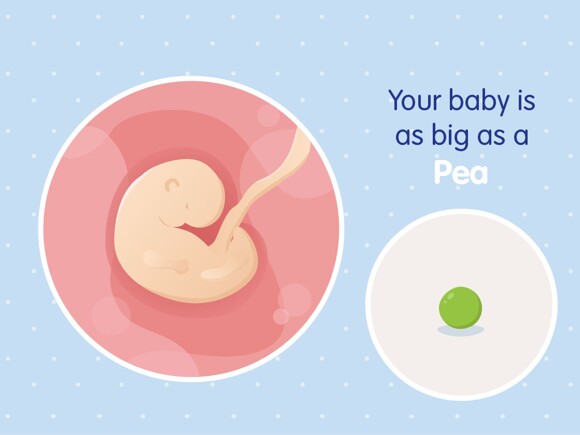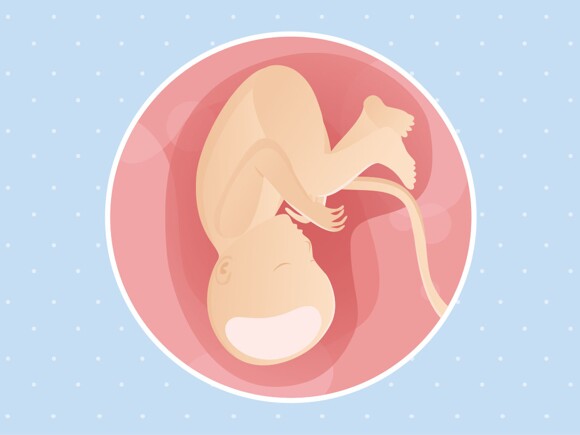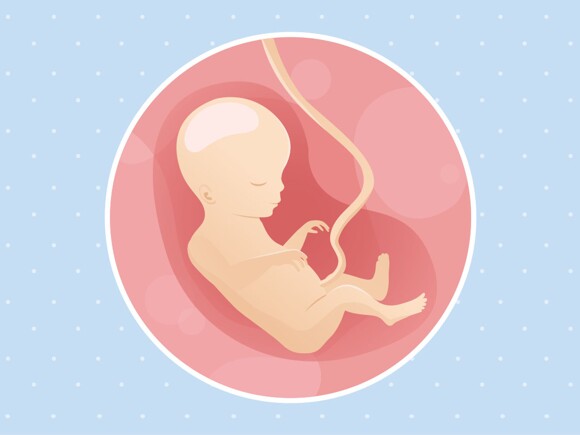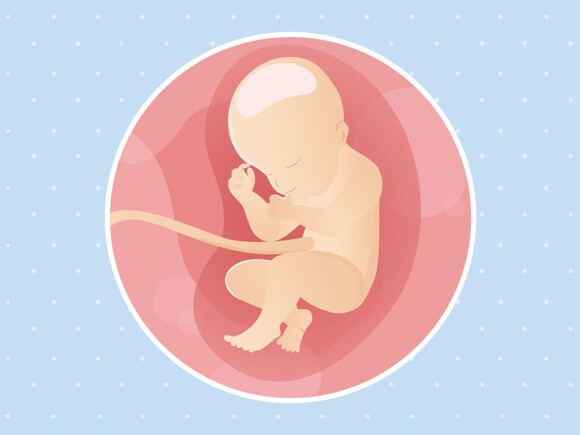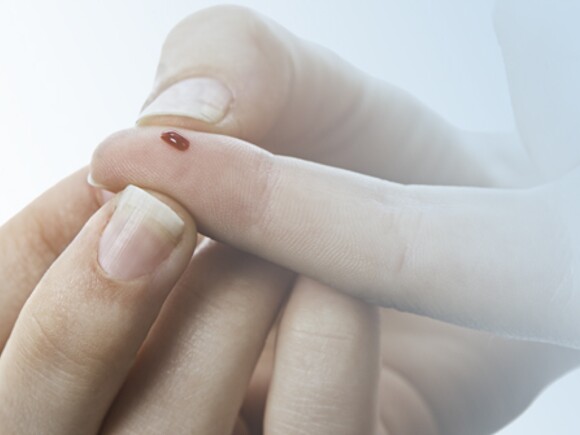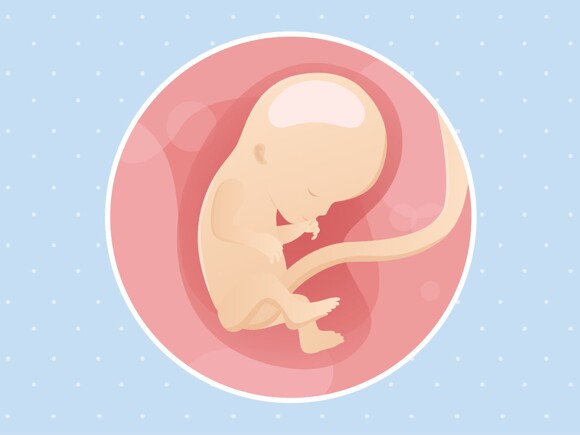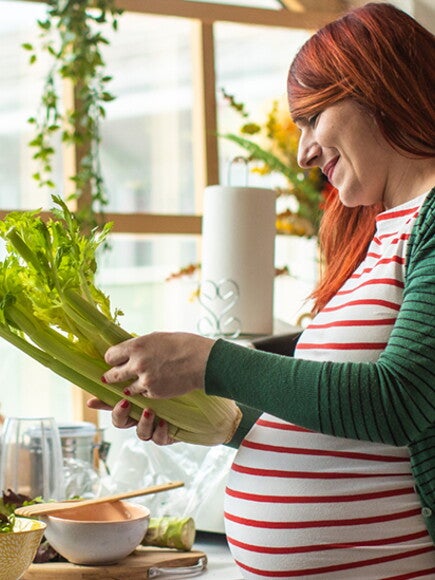Eating for two doesn’t mean eating twice as much food, but it should mean making your food work twice as hard.
Make every calorie count by choosing nutrient-dense foods, in other words get more bang for your calorie buck. By choosing a variety of food from all food groups, you can be assured of a well-balanced diet. But what if you have no appetite some days or occasionally feel nauseous? Remember, a quality diet over several days is what counts, not meal by meal.
Watch this video to learn what is considered normal pregnancy weight gain and what types of foods you should be including in a healthy pregnancy diet.
What’s the right plan for me?
These food recommendations, are an easy way to get started on a healthy pregnancy. Of course, your beginning weight, height, age, stage of pregnancy and the number of children you are carrying will determine how many calories and how much food you will need.
Typically your energy requirements don’t increase during the first 3 months of pregnancy. You will need about 350 extra calories per day during the second trimester and 450 extra calories per day during the third trimester1. Including an extra snack or adding more food to a meal will help you meet these energy requirements.
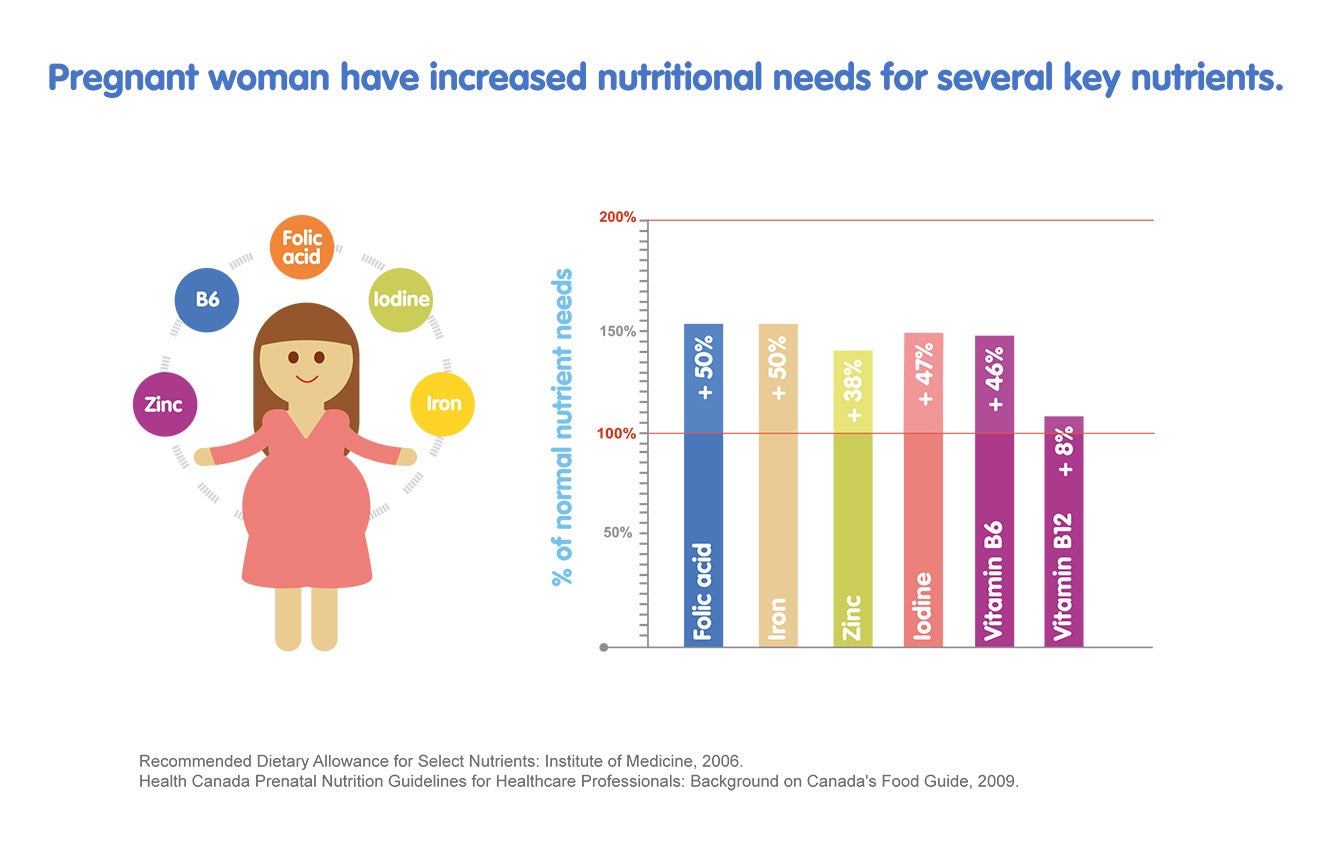
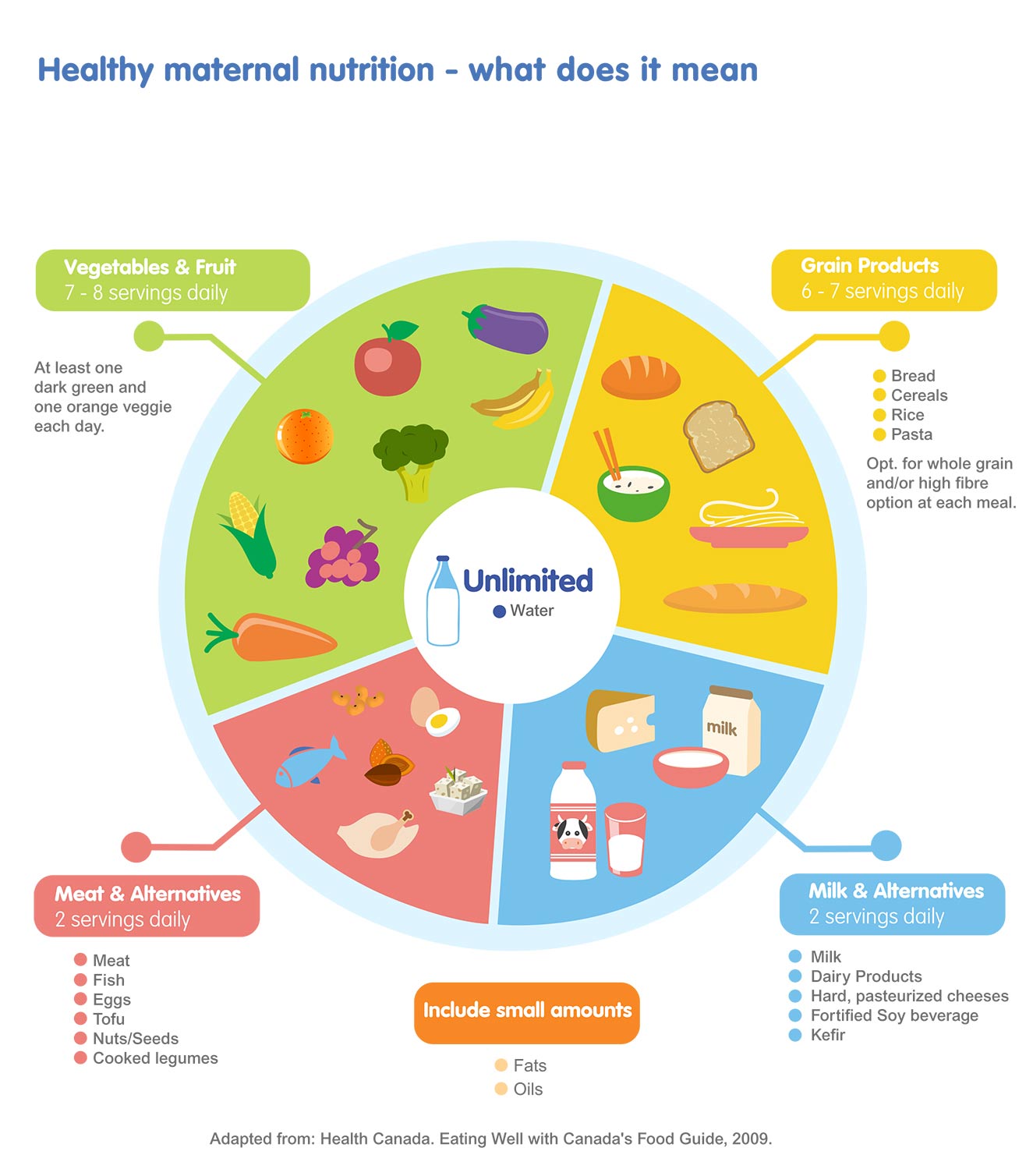
Nutritional recommendations during pregnancy
Vegetables and Fruit
- At every meal.
- Raw or cooked.
- Fresh, frozen or canned.
During pregnancy, make sure that fresh vegetables and fruits are carefully washed before cooking or consuming raw.
- Eat at least one dark green and one orange vegetable each day.
- Choose vegetables or fruits prepared with little or no added fat, sugar and salt.
- Have vegetables and fruits more often than juice.
Whole Grain Products
- Choose whole grain foods over refined grains.
- Choose whole grain products that are lower in fat, sugar and salt.
- Go for a variety: brown rice, whole grain wheat, oats, barley, and quinoa.
- Try new whole grains, like farro, freekah, amaranth, or buckwheat.
Protein-rich foods, including beans, lentils, tofu, nuts, lean meats and poultry, fish, shellfish, eggs, and lower fat dairy products
- Meat: select lean meat and alternatives prepared with little or no added fat or salt.
- Choose lean meats, like skinless poultry
- Have plant-based protein foods, such as lentils and tofu, more often.
- Fish: at least 150 g of cooked fish each week. Eat a variety of fish, such as char, herring, mackerel, salmon, sardines and trout.4
- During pregnancy:
- Fish: avoid fish that contain high levels of mercury (shark, swordfish, fresh or frozen tuna, marlin, orange roughy and escolar), smoked fish and seafood, and fish from contaminated rivers. Low-mercury, fish or seafood (salmon, shrimp, canned light tuna, pollock, sole, flounder, anchovy, char, lake white fish, etc...) are safe.
- Meats: avoid deli meats, cold cuts, pates and liver. When cooking meat and fish, check the temperature to ensure the meat is well done.
- Select low fat milk alternatives such as fortified soy or almond milk.
- Milk and fortified milk alternatives are a main food source of vitamin D.
- During pregnancy, only eat pasteurised dairy products. Cheese: avoid soft cheeses unless served cooked and hot. Instead opt for hard cheeses (cheddar, Monterey Jack, parmesan, etc...).
Fats and oils
Include only a small amount of unsaturated fat each day
- Try to eat a variety of soft, non-hydrogenated margarines and vegetable oils (olive oil, canola oil etc.).
- Limit butter, hard margarine, lard and shortening.
Beverages
Make water your drink of choice
- Satisfy your thirst with water.
- Limit beverages that are high in calories and low in nutrients (fruit flavoured drinks, soft drinks, and energy drinks).
- Limit caffeine intake to 300 mg per day2.
- During pregnancy and breastfeeding, it is recommended to not drink any alcohol at all.
Be active
Staying active during pregnancy can help reduce your risk of developing pregnancy complications. Aim for at least 150 minutes of moderate-intensity physical activity each week, like a brisk walk or a swim4. Avoid activities that involve physical contact or danger of falling. If you have medical conditions or a high-risk pregnancy, check with your doctor first to make sure it’s safe for you to exercise.
SURPRISE! Healthy fats, in moderation, are good for you. Choose food high in unsaturated fats, such as olive oil, nuts, seeds and avocado. Omega-3 fatty acids are also important during pregnancy and a good source of these is fatty fish, like salmon.
What's on your plate?
Here is a quick reference table which summarises what these key nutrients and other components do and in which foods to find them
| Nutrient | For | From |
| Protein | Helps build strong muscles (and bones) | Meat, fish, eggs, cheese, dairy |
| Carbohydrates | Supply energy | Pasta, rice, bread, cereal, legumes, potatoes |
| DHA (docosahexaenoic acid) | Contributes to baby’s brain and eye development | Fish, DHA-containing supplements |
| Probiotics | Contribute to a healthy gut flora | Probiotic products, such as probiotic yoghurts, supplements |
| Vitamin | For | From |
| Folic acid | Helps prevent neural tube defects when taken daily prior to becoming pregnant and during early pregnancy. Read more about the benefits of folic acid during pregnancy here. | Dark green leafy vegetables, dried beans, nuts, enriched pasta and bread, breakfast cereals |
| Vitamin B1 (Thiamine) | Important for energy production and carbohydrate metabolism | Meat, potatoes, whole grain products |
| Vitamin B2 (Riboflavin) | Factor in energy metabolism and tissue formation. Important for energy production and carbohydrate metabolism | Dairy products, enriched pasta and bread, breakfast cereals |
| Vitamin B12 | Important for red blood cell formation | Fish, meat, poultry, dairy |
| Vitamin C | Important for immune system, collagen synthesis | Citrus fruit, kiwi fruit, broccoli and sprouts |
| Vitamin A | Supports the immune system, healthy skin and night vision | Carrots, spinach (as beta-carotene) |
| Vitamin D | Helps build strong bones and teeth | Sunlight, fish, eggs yolks |
| Vitamin E | A dietary antioxidant | Wheat germ/canola/olive oils, in the fats of meat, poultry and fish |
| Minerals and trace elements | For | From |
| Calcium | Helps build strong bones and teeth | Milk, cheese, dairy products, bony fish, legumes |
| Magnesium | Contributes to normal muscular functions | Nuts, green vegetables, legumes |
| Iron | Important for oxygen transport and blood formation | Meats, wholegrain cereals, fish, poultry, spinach, lentils |
| Iodine | Factor in the normal function of the thyroid | Fish, iodized salt |
| Selenium | Dietary antioxidant | Seafood, poultry, eggs, asparagus |
| Zinc | Helps support the normal function of the immune system | Meat, poultry, dairy products, fish |
References:
1 Health Canada, 2010. Prenatal Nutrition Guidelines for Health Professionals – Background on Canada’s Food Guide. Available at: https://www.canada.ca/en/health-canada/services/publications/food-nutrition/prenatal-nutrition-guidelines-health-professionals-background-canada-food-guide-2009.html
2 Health Canada, 2012. Caffeine in food. Available at: https://www.canada.ca/en/health-canada/services/food-nutrition/food-safety/food-additives/caffeine-foods/foods.html
3 Health Canada, 2009. Prenatal Nutrition Guidelines for Health Professionals – Fish and Omega-3 Fatty Acids.
4 Canadian Society for Exercise and Physiology. 2019 Canadian guideline for physical activity throughout pregnancy. https://csepguidelines.ca/guidelines/pregnancy/
Join
Your parenting instincts, our support
SIGN UP & GET A CHANCE TO WIN
Sign up for Nestlé Baby & me and automatically be entered for a chance to win a $100* gift card!
For full details, please visit the Terms & Conditions.
PERSONALIZED EMAILS & SUPPORT
Receive customized email updates with useful info, special offers, and product suggestions to help guide you through each parenting phase and celebrate your milestones along the way.
HELPFUL TOOLS & RESOURCES
Need a hand with something? We’ve got you covered! Access our helpful and interactive parenting tools and resources like calendars, calculators, checklists, and healthy recipes in one convenient hub.
EXPERT GUIDANCE
We offer science-based advice and specialized nutritional guidance for every stage of the parenting journey—from preconception to toddlerhood.
*When registration is during pregnancy. If your baby’s already been born, expect to see your kit within a month
Still haven't found what you are looking for?
Try our new smart question engine.





